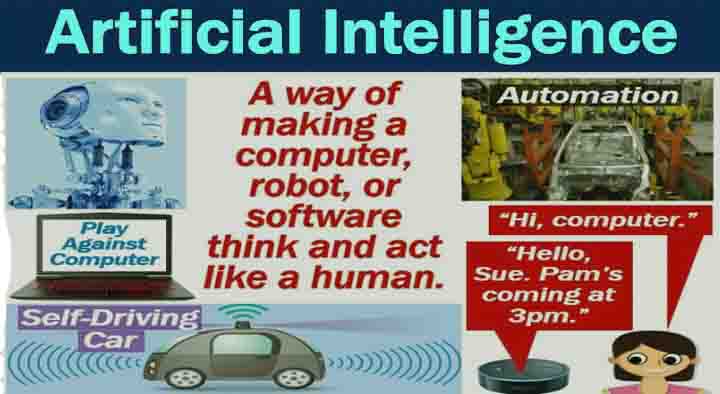Meaning of Artificial Intelligence: AI means Artificial Intelligence, you must have heard this word many times, do you know what it means? How was it discovered? If it doesn’t then how does it work so let’s start
Meaning of Artificial Intelligence, which is called artificial intelligence, you must have got an idea of its function, which means the brain is given by humans to machines so that they can think and act like humans. Looking for how to find it.
The first person to bring artificial intelligence to the world was John McCarthy, an American computer scientist who spoke about it at the 1956 Dartmouth conference.
Table of Contents
Objectives of Artificial Intelligence (AI)
Creating a system that automatically learns, interprets, and advises its users. We build machines so that we humans can do more and more work in less time, as well as we can think, learn, understand and behave like humans.
You May Also Like: Benefits of Social Media Marketing for Small Businesses
Top courses in artificial intelligence
- Machine Learning
- Programming for Everybody (Getting Started with Python)
- Networks and Deep Learning
- 4AI For Everyone
- Data Science
- 6Fundamentals: Core Infrastructure
Artificial intelligence types
001 Weak AI –
This type of AI is called Narrow AI, you must have guessed from the word narrow that it has some limitations as it can only do one thing at a time, for example, Apple’s Siri.
002 Strong AI –
This type of AI is also called General Artificial Intelligence, whose main goal is that machines think like humans and their intellectual ability should be equal to humans and they should also find solutions to any difficult task.
Furthermore, Arend Hintz, an assistant professor of integrative biology and computer science and engineering at Michigan State University, classified AI into 4 categories.
(1) Reactive machines
This type of machine is very basic, it does not save memory and also does not remember its previous steps which should be used in the future.
The best example of this is IBM’s Deep Blue, a chess program that defeated Garry Kasparov in the 1990s.
(2): Limited memory
Such AIs use their experience to decide their future like self-driving cars.
(3): Theory of mind
It is a hypothetical concept where machines sense human emotions although they can communicate socially. does not exist in reality.
(4): Self-awareness
As its name suggests, this type of machine has self-awareness and consciousness. It can also be called a kind of human being, although it does not exist yet.
Benefits of artificial intelligence
- Will not be affected by a hostile environment, thus will be able to perform dangerous tasks, explore space and endure problems that can injure or kill us.
- This could mean mining and fuel mining which would be harmful to humans.
- Repetitive, tedious work replaces people in many laborious places.
- Predict what the user will type, ask, find, and do. They can easily act as killers and recommend various actions.
- Examples of this can be seen on smartphones.
- Card-based systems may detect fraud and possibly other systems in the future.
- Organizes and manages records.
- Interact with humans as an avatar or robot for fun.
- An example of this is the AI for playing many video games.
- Robotic pets can communicate with humans. It May help with depression and inactivity.
- They can think logically without emotion, and make rational decisions with little or no error.
- People can be evaluated.
- This may be for treatment, such as health risks and emotional states. Medical procedures can mimic and report side effects.
- In the future, robotic radiosurgery, and other types of surgery, may achieve accuracy that humans cannot.
- They do not need to sleep, rest, take breaks, or rest because they are not bored or tired.
Disadvantages of Artificial Intelligence-
- Construction, reconstruction, and repair can cost a lot of money and time. Robots can be repaired to reduce human time and requirements,
- Storage is extensive, but access and retrieval as humans cannot make connections in memory.
- They can learn and get better by deeds, but there are doubts about whether they will be as good as humans.
- They cannot function outside of what they were programmed for.
- This can prevent people from empathizing with feelings of communication, such as being a nurse. This may reduce the understanding of knowledge.
- This can prevent common sense from being held. Even with common sense coded for more learning, it is difficult for people to acquire as much general knowledge as they can.
- Robots, along with them job replacements, could cause severe unemployment unless people fix unemployment, get AI jobs, or turn the government into communism.
- as already has been seen with smartphones and other technologies, people can become overly dependent on AI and lose their mental abilities.
- It is easy to handle the machines in the wrong hands which can lead to destruction. That means at least a lot of people are afraid.
- AI can surpass humans as robots, and enslave us.
Conclusion
In this article, we have told you about the advantages and disadvantages of the Meaning of Artificial Intelligence in Education, and have given you all the information about Artificial Intelligence, we hope you have liked the information.
You May Also Like: The Benefits of Social Media Marketing for a Company

